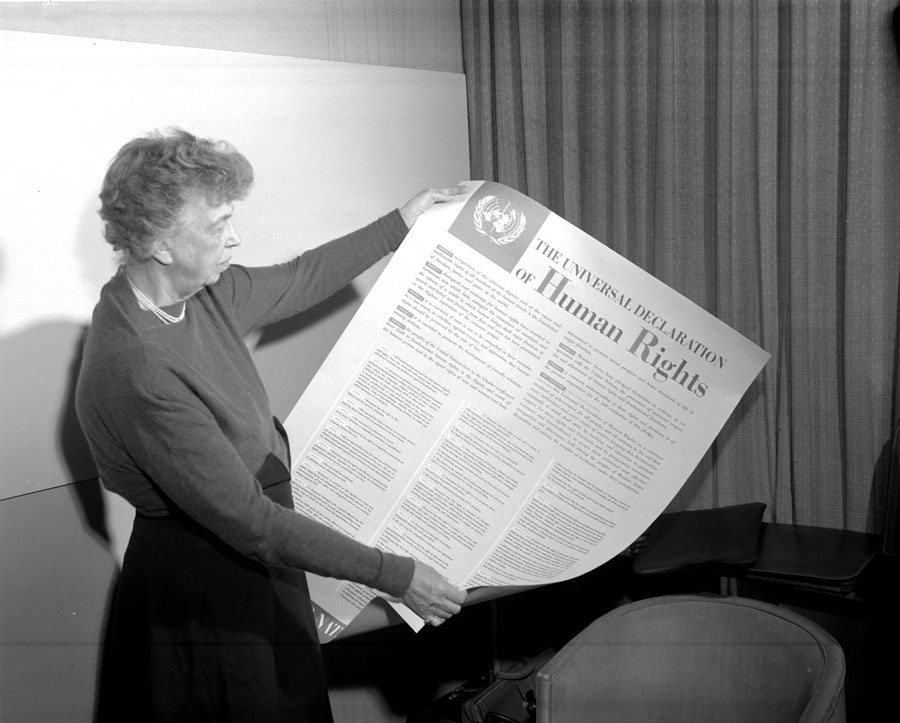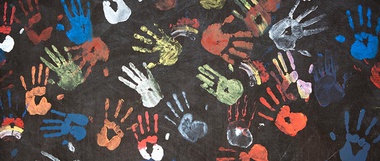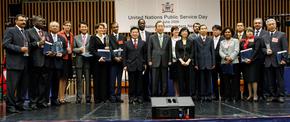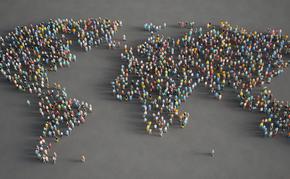The views expressed in our content reflect individual perspectives and do not represent the authoritative views of the Baha'i Faith.
Every year on December 10th the world observes Human Rights Day, marking the day the United Nations General Assembly adopted the Universal Declaration of Human Rights.
That 1948 declaration, the first of its kind in human history, proclaimed the inalienable rights every human being is inherently entitled to—regardless of race, color, religion, sex, language, political or other opinion, national or social origin, property, birth or other status.
In the 69 years since its adoption, the UDHR has become one of the most translated document in the world, available in more than 500 languages.

Eleanor Roosevelt, chair of the UN Human Rights Commission, holds the historic document.
Drafted by representatives of diverse legal and cultural backgrounds from all regions of the world, the UDHR sets out universal values and a common standard of achievement for all peoples and all nations. It establishes the equal dignity and worth of every person. The Declaration uplifts the dignity of millions, and lays the foundation for a more just and equitable world. While its promise hasn’t yet been fully realized, the very fact that it has stood the test of time testifies to the enduring universality of its perennial spiritual values of equality, justice and human dignity.
The Universal Declaration of Human Rights empowers us all. A deceptively short and simple document, with a brief preamble and thirty brief articles, you can easily read it in a few minutes. If you’ve never seen it you owe it to yourself to take a look.
After the preface, it begins like this:
THE GENERAL ASSEMBLY proclaims THIS UNIVERSAL DECLARATION OF HUMAN RIGHTS as a common standard of achievement for all peoples and all nations, to the end that every individual and every organ of society, keeping this Declaration constantly in mind, shall strive by teaching and education to promote respect for these rights and freedoms and by progressive measures, national and international, to secure their universal and effective recognition and observance, both among the peoples of Member States themselves and among the peoples of territories under their jurisdiction.
No worldwide body; no nation; no culture and no society has ever done this before–in one document, at one time, proclaim the “common standard of achievement for all peoples and nations” to declare that each human being has inalienable rights and freedoms granted by God.
However—the Baha’i teachings began to advocate for a universal declaration of human rights in the middle of the 19th century, when Baha’u’llah addressed the world’s political and religious leaders and counseled them to recognize and respect the human rights of all people. In 1912, thirty-six years before the UDHR’s adoption, Abdu’l-Baha said:
Baha’u’llah taught that an equal standard of human rights must be recognized and adopted. In the estimation of God all men are equal; there is no distinction or preferment for any soul in the dominion of His justice and equity. – Abdu’l-Baha, The Promulgation of Universal Peace, p. 181.
Throughout all of human history the rights and freedoms of humanity came, often by fiat, from governments, kingdoms and fiefdoms, religious authorities or the rule of force. Some still do–but the UDHR has helped change that reality in its 69-year existence. Since 1948, the majority of the world’s governments have recognized the rights and freedoms of their citizens. We still have a long way to go, especially in fragile states and the remaining despotic oligarchies that run roughshod over the human rights of their residents. But now, with this document and the spiritual impetus behind it setting the standard for freedom, the human race has begun to move ineluctably toward its grand vision—and the vision of the Baha’i teachings.
During the two year period before the United Nations adopted and codified the UDHR, many individuals, groups and organizations worked together on the document, making recommendations for its composition. The Baha’i International Community, headquartered in New York, made its contribution, too–called A Baha’i Declaration Of Human Obligations And Rights, presenting it to the first session of the United Nations Commission on Human Rights, chaired by Eleanor Roosevelt and held at Lake Success, New York in February of 1947. The Baha’i Declaration began this way:
The source of human rights is the endowment of qualities, virtues and powers which God has bestowed upon mankind without discrimination of sex, race, creed or nation. To fulfill the possibilities of this divine endowment is the purpose of human existence. – Baha’i International Community, A Baha’i Declaration of Human Obligations and Rights, February, 1947.
As the process drew to a close, much of the substance and wording of the Baha’i document found its way into the Universal Declaration of Human Rights.
While the work went forward to complete the UDHR, the Baha’i International Community began laboring for its adoption around the world. Baha’is in various countries urged their governments to recognize and ratify the UDHR, and after its completion and successful ratification the Baha’is advanced an intensive campaign to recognize the Declaration and help educate the world about it. That campaign, called Human Rights Are God-Given Rights, took root in the United States first, but soon spread globally, making the Baha’i community the earliest religious organization to advocate for universal protection of the human rights of all people.
One of the most prominent statements in the Baha’i document seems especially powerful and prescient today:
The true destiny of the national state is to build the bridge from local autonomy to world unity. It can preserve its moral heritage and function only as it contributes to the establishment of a sovereign world. Both state and people are needed to serve as the strong pillar supporting the new institutions reflecting the full and final expression of human relationships in an ordered society. In delaying to fulfill the historic mandate given the peoples and nations of our age to unite, we give opportunity and encouragement to subversive forces whose weapon is confusion and whose aim is chaos. – Ibid.
So how can we celebrate Human Rights Day? We can all join forces with those working for human rights in today’s world, and pledge to do what we can to extend those rights to everyone.
You May Also Like
Comments

















tamaso ma jyotirgamaya,
mrityorma amritamgamaya
Om shantih shantih shantih
Oh Almighty! Lead us from the unreal (falsity)
to the real (truth) from darkness to light!
From death to immortality!
Oh Almighty! May there be Peace! Peace! Peace!
brihdaranyaka upanisada 1:3:28 - india